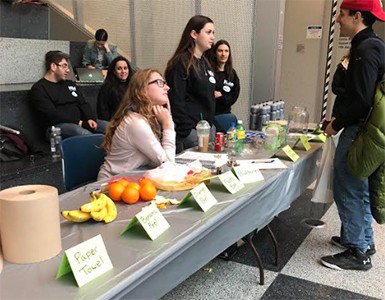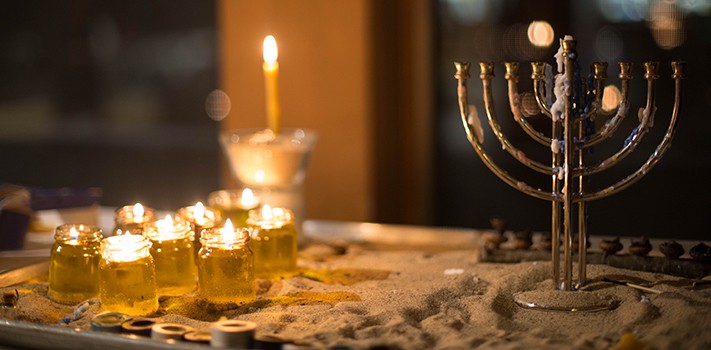by Shaked Landor
Wondrous as it is, the miracle of Chanukah, in which an oil flask meant to last one day instead lasted eight, seems dwarfed in today’s world of everlasting products: plastic bottles, diapers, aluminum foil, electronics, to name a few. But its essence remains, teaching us the importance of valuing what we have.
On the eve of Thanksgiving, I attended an event at John Jay College of Criminal Justice on behalf of Hazon. The college’s Hillel and environmental club teamed up to hold an hour-long “decomposition activity” to shed some light on just one of many environmental issues: waste. I witnessed students and faculty – some perplexed, some intent on finding answers – try to guess the rate of decomposition for a variety of items for the prize of a reusable water bottle or mug. Placed on two long tables were numerous objects: paper towels, banana peels, orange peels, plastic bags, batteries, plastic bottles, diapers, glass containers, electronics, and tin foil (purposely put in order from shortest to longest decomposition rates, unbeknownst to the participants). Some participants intuitively knew that the fruit on the table decomposes – decays or breaks down into simpler matter – faster than, say, a cell phone. But to the shock of many, myself included, we learned that some items like tin foil never decompose. It was certainly difficult to grasp. I was morbidly fascinated that something I use regularly will last for centuries ahead of me. After the event, I went home thinking about what I could do to replace or recycle (at the very least) these everlasting objects.
A w eek or so after the activity, I started thinking about Chanukah, which was rapidly approaching. I remembered the miracle of the Festival of Lights: a single day’s supply of oil lasted eight days instead. What was miraculous in one scenario could actually be quite concerning in today’s world. Our products can last hundreds of years, and yet the rate at which we dispose of them far surpasses their shelf life. Instead of viewing these timeless objects as wondrous inventions, I understood that they are actually problems in a world where waste piles up by the pound daily.
eek or so after the activity, I started thinking about Chanukah, which was rapidly approaching. I remembered the miracle of the Festival of Lights: a single day’s supply of oil lasted eight days instead. What was miraculous in one scenario could actually be quite concerning in today’s world. Our products can last hundreds of years, and yet the rate at which we dispose of them far surpasses their shelf life. Instead of viewing these timeless objects as wondrous inventions, I understood that they are actually problems in a world where waste piles up by the pound daily.
According to the U.S. Environmental Protection Agency, trash accumulation and debris can have an impact on human and wildlife habitats through chemical contamination due to plastic particles and from trash ingestion and entanglement. The problem ties into our consumption habits: it’s convenient and often inexpensive to buy and replace instead of repair and recycle or, highest on the 3-R’s totem pole, reduce!
I propose that we add a 4th R to the very top: reassess. We ought to reassess how we can apply the miracle of Chanukah – the lesson that begs to be taught about resource preservation and reaping the most out of the countless products we consume – and actually make those everlasting products last as long as possible in our consumption cycle.
So how do we take the miracle, the lesson, and the value of Chanukah and apply it to our consumption culture when the miracle of “lasting” is not necessary, but actually is a serious environmental problem? We reassess how we use these products by transposing onto our consumption habits the Chanukah miracle of longevity. Things meant to last forever should; we can extend their use as long as possible. Try to repair instead of replace, for one. To get the ball rolling, visit Hazon’s Sustainable Chanukah Resource page or explore below for sustainability tips!
Here are 8 Chanukah-inspired tips to make the things we consume last longer:
- Purchase a Menorah made from recycled materials or create an upcycled one
- Opt for non-plastic dreidels
- Give a Chanukah gift that’s reused or regifted (for example, hold a White Elephant office party that uses only recycled, reused, or regifted gifts as part of the exchange!)
- Use old newspaper or magazines to wrap presents and reuse gift bags
- Wrap your leftover latkes and soufganiyot (doughnuts) – if there are any! – in reusable cloth or containers instead of tin foil or plastic wrap
- Send e-cards instead of mailing holiday cards
- Reduce the number of candles lit by lighting one Menorah together at home or in your work space
- Compost uneaten food scraps at your holiday parties
Shaked Landor is the Sustainability and Community Engagement Fellow at Hazon.





Comments are closed.